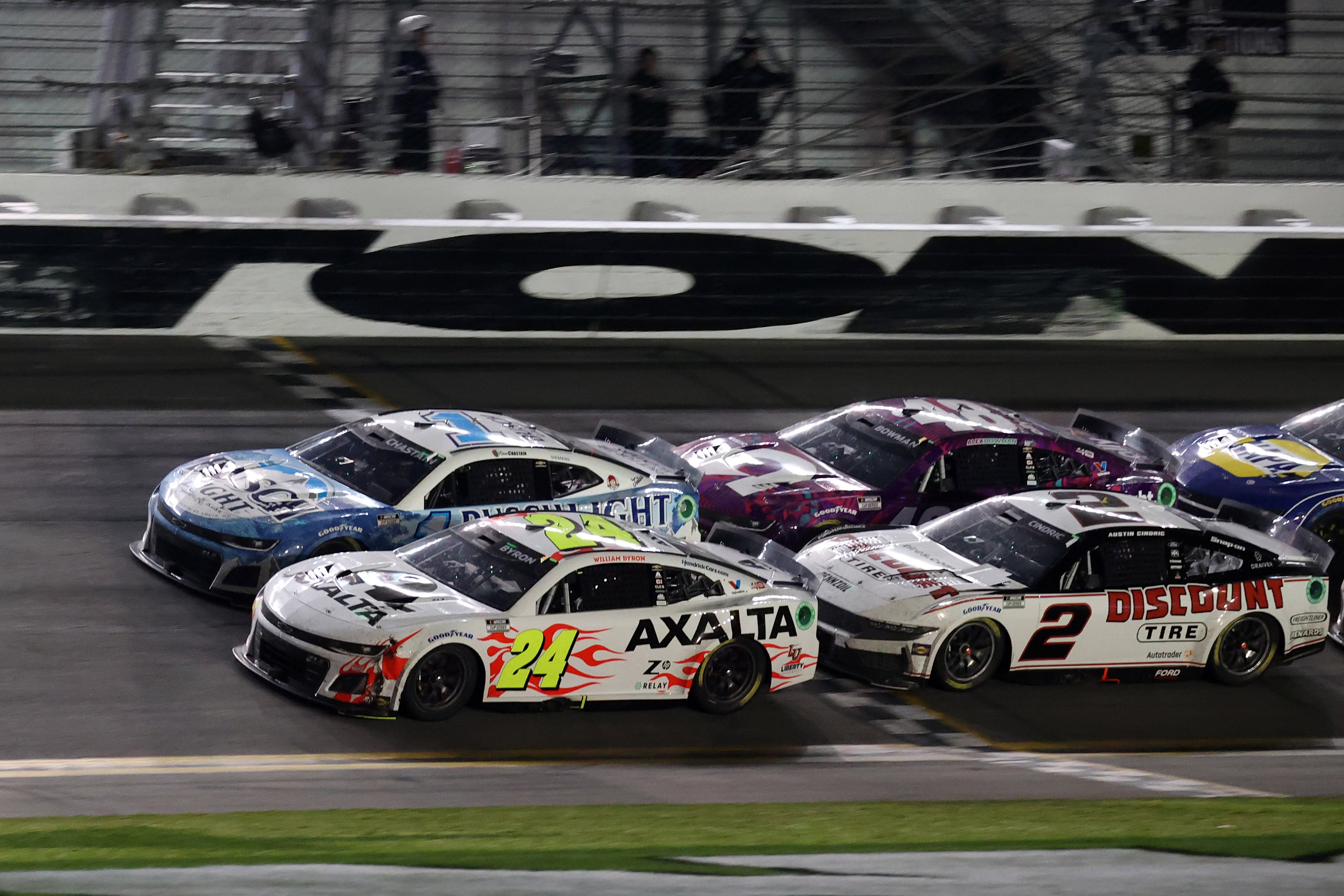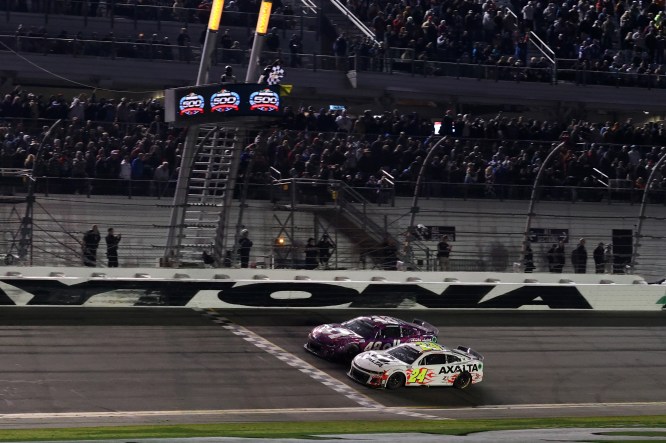
“It’s usually the people that start the wreck that stay alive. That’s the frustrating part.”
Joey Logano
That was no doubt a veiled statement of disappointment towards Daytona 500 winner William Byron and/or Alex Bowman, who pushed him, in triggering the 22-car pileup with nine laps remaining that completely changed the dynamic of the Great American Race on Monday night.
But really, everyone was just going for it, by every definition of the idiom.
Logano had led a race high 44 laps and had a car that routinely showed the most pure speed and drivability. The big crash began as he was drifting down ever so slightly at the same time Byron had a push from Bowman.
Byron spun into Keselowski, which actually righted his car, but sent Keselowski up the track and into Logano. That blocked the field and a majority of the front runners all piled into the ensuing melee.
All things equal, and the modern superspeedway racing rarely is, the Team Penske No. 22 had a car that could do anything Logano wanted it to but just never had a chance at racing to the finish.
“The car was so fast,” Logano said. “The car was the fastest car on the track. I could lead a line. Whenever we weren’t saving fuel she was a rocket ship. It’s just how this game works. The wreck always starts in the front and you hope you’re in front of it. Second place isn’t far enough ahead.”
Within the final 15 laps, the pushes get ‘stupid’ and the Great American Race turns into a game of chance.
“Everybody just gets more and more intense,” Logano said. ” You know it’s going to happen. Anyone can see it happening. You just know it. It happens every year. With 10 to go there’s going to be a caution.
You just hope you’re not in it and you can’t ride around. You can’t just sit there and not race because you’ll be too far back and won’t win that way. You just have to be one of the lucky guys right now like (Byron), (Bowman), (Austin Cindric) and (Chase Elliott) that are still alive to do it.”
Reigning NASCAR Cup Series champion Ryan Blaney was one of the first ones to pile in and agreed it was just a push from Bowman on Byron that resulted in the carnage.
“I saw a replay and I kind of saw (Bowman) and (Byron) shoving hard and it looks like (Bowman) got out of shape and then (Byron) was trying to find him and then by that time he got turned into Brad and then we were just a byproduct of being in the top lane.
“I couldn’t see a ton, but replay showed just hard pushing and it is what it is.”
William said it was all a byproduct of the noses on the Chevrolets and the impending inevitability of superspeedway racing.
“I hate that it happened,” Byron said. “The 48 and I were working well together on the bottom and somehow got shufled or moved to the middle. He was pushing me in that sequence.
“The 6 (Keselowski) and 1 (Chastain) were snaking all three lanes. Honestly, I think we just got misaligned with our push and I got sideways and hooked the six.
“I feel really bad about that. Things were getting really intense with our pushes. I felt like it was getting to the point I couldn’t handle all the pushes and you just try to get through those moments.”
Four, three, two laps to go …

Then came the final restart with four laps to go, Byron and Chastain controlling a line respectively, a battle ultimately won by Byron.
But that didn’t win him the race … yet.
Byron, Austin Cindric and Corey Lajoie, on the bottom, all cleared Chastain with two laps to go but it wasn’t the end yet for any of them.
Byron faded high to block Chastain and his momentum coming to the white flag on the frontstretch. Chastain darted low. Simultaneously, Lajoie gave a shove to Cindric, who was pushed up the track into Chastain and it sent both cars into the infield grass and out of contention.
It was pretty much a racing deal for the biggest race of the year and both Lajoie (who finished fourth) and Chastain, went for it.
“The 2 (Cindric) left the bottom open and I tried to fill it kind of late, lazily and he kind of blocked it, lazily,” Lajoie said. “The 16 (AJ Allmendinger) went with me. The 1 (Chastain) called it quick to try to fill the bottom and get out front. He did the move he needed to do to win the race and I’m glad we came out the other side.”
Chastain virtually echoed that sentiment.
“I took the gap,” Chastain said. “I don’t apologize for that. I can go to sleep at night knowing that I took the white flag making a move to win the Daytona 500.”
Then came a conversation between Cindric and Chastain where they reached an understanding over what happened … ultimately pinning it on Lajoie.
Cindric didn’t see it as him giving up the bottom because he says Lajoie moved him off the bottom.
“Corey finished fourth, so congrats,” Cindric said. “He tried to fit a car where there wasn’t a car and just continued to push through my left-rear until I wrecked. I understand trying to shuck me out or put up an opportunity because I was in probably the best spot possible coming to the white but I’m in the care center and I don’t even know where I finished, so it really sucks but that’s racing.”
The finish

The caution, which came immediately after the leaders crossed the line, ended the race. The field is frozen at the time of the caution if the leader had already taken the white flag.
But the question was who was leading at the time the decision was made to put it out, NASCAR vernacular for when the caution came out. Bowman was closing on Byron close but NASCAR deemed the Hendrick Motorsports No. 24 the winner over the Hendrick Motorsports No. 48.
And this was the basis for that decision.
All things considered, this was a clean Daytona 500, with the only natural cautions taking place on Lap 6, Lap 191 and Lap 200. It will just get overlooked because the meat of the figurative sandwich took out 22 cars.
“I can’t believe we didn’t have more crashing honestly because all it takes is one wrong push, especially with our (Chevrolet) noses because we get off-center so easily with the shape of them,” Byron said.
Matt Weaver is a Motorsports Insider for Sportsnaut. Follow him on Twitter.